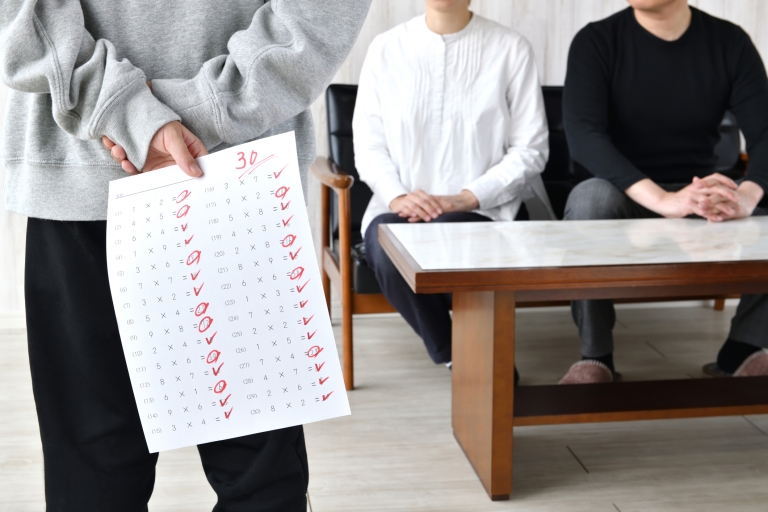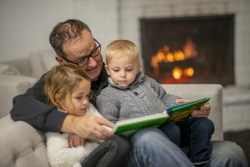2/21/25 blog post
how to respond when kids make a mistake
helpful tips for parents to support their kids
When your kid makes a mistake, how do you respond?
We want to reassure our kids with phrases like, “Everyone makes mistakes!” or “Nobody’s perfect!” But sometimes, in the heat of the moment, we might find ourselves saying something like, “How could you be so irresponsible?”
"We know that mistakes are a natural part of life, and how we react can have a big impact on how they view themselves when they make a mistake," shares children's mental health expert, Emily Weitz. "If we’re not careful, we might unintentionally teach our kids that mistakes are something to avoid or be ashamed of, which can affect their confidence and well-being."
That’s why the On Our Sleeves experts have put together simple tools to help you respond in a way that supports your kid and turns mistakes into learning moments:
- Phrases to use in the moment that encourage a healthy view of mistakes
- Ways to be a positive role model when it comes to mistakes
- Books and resources that can help spark helpful conversations
- Conversation starters to turn mistakes into teachable lessons
"By responding with understanding and encouragement, we can help our kids build resilience and learn that mistakes are just another opportunity to grow," says Emily.
changing your responses, changes your kid’s perspective
We’re all a work in progress, and kids are constantly learning from their mistakes. To help them grow, we need to shift our thinking—and theirs—so that mistakes become opportunities to learn and improve. How we respond to their mistakes can shape how they react to failure. By shifting our responses from frustration to patience and encouragement, we can help them build resilience and develop a positive attitude toward challenges.
So how do we put this into practice?
Here are a few practical examples that may happen and give you an opportunity to try your new perspective:
1. If your kid comes home with a low grade or an assignment full of corrections:
| instead of saying: | you could try saying: |
| “You need to take school more seriously and check your work more carefully” | “Schoolwork can be hard at times. I can try to help you or we can email your teacher together.” |
| “Next time you need to slow down and take your time” | “When schoolwork is long, tell yourself, ‘I will learn, I will practice, I will ask for help.’” |
2. If your kid spills milk or food on the floor:
| instead of saying: | you could try saying: |
| “You’re so clumsy!” | “Accidents happen! Here’s a wet rag to clean it up.” |
| “You need to be more careful!” | “Everyone makes mistakes! Do you need help cleaning it up?” |
3. If your kid leaves their homework at home or forgets a school project:
| instead of saying: | you could try saying: |
| “Why are you so irresponsible?” | “It’s frustrating when we forget something, but it happens sometimes.” |
| “How could you forget? I even reminded you!” | “Let’s put it in your book bag now so you won’t forget it tomorrow.” |
4. When you make a mistake in front of your kids
Kids learn more from what they see and observe than from what they are told. Kids are watching us and seeing how we our own mistakes. If we are super critical of ourselves, they will learn that making mistakes is a bad thing. The next time you make a mistake, point it out and turn it into a learning opportunity by using these phrases:
- “Oops! Looks like I made a mistake. It happens to everyone.”
- “I didn’t get the right ingredients for dinner today, but let’s see what we can make with what we have!”
- “Even grown-ups make mistakes sometimes—it’s how we learn.”
- “This is tough, but I know I can do hard things.”
- “I don’t know how to do this… yet.”
- “Let’s try a different way next time.”
- “I’ll keep practicing, and I’ll get better.”
- “Mistakes are how I learn and grow!”
By reframing mistakes as opportunities to learn, we’re encouraging our children’s emotional wellbeing. How could you respond to a mistake your kid made today in a way that encourages growth?
Exploring mistakes through stories
Books and conversations are powerful tools for helping kids learn about mistakes and shift their perspective. Taking time to read stories together and discussing making mistakes can set the stage for a more positive, resilient mindset the next time one happens. These moments not only help your child understand that mistakes are part of the learning process but also open the opportunity for meaningful discussions that reinforce growth and perseverance.
Here are a few books that can help spark those important conversations:
- “Mistakes That Worked” by Charlotte Foltz Jones– Discover the amazing stories behind inventions and discoveries that came from mistakes.
- “IMPERFECT: Poems About Mistakes: An Anthology for Middle Schoolers” by Tabatha Yeatts – A collection of poems that explore the beauty and learning in imperfection, perfect for older kids.
- “Help Your Dragons Learn From Mistakes” by Steve Herman- This fun and engaging book teaches kids how to learn and grow from their mistakes with the help of colorful dragons!
- “Your Thoughts Matter: Growth Mindset” by Ester Pia Cordova, illustrated by Mariya Elizarova – A wonderful book for teaching the basics of growth mindset and how our thoughts shape our ability to learn.
Reading these books and discussing their messages with your child can help normalize mistakes as opportunities to grow. Together, you’ll be better prepared to handle challenges and setbacks with a mindset that embraces learning at every step.
Helpful conversation starters to talk about making mistakes
Starting the conversation about mistakes with your kids can help them understand that mistakes are part of the learning process. Here are a few questions to spark meaningful discussions:
- “Is it okay to make mistakes? Why or why not?”
- What do you think is the difference between making a mistake on purpose and making a mistake on accident?
- “How do you feel when you make a mistake?”
- “How can we support our friends or family members when they make a mistake?”
Using these conversation starters regularly can help your child embrace mistakes as part of their growth and encourage them to approach challenges with a positive, resilient mindset.
It can be easy to unintentionally get down on yourself and your kids when mistakes happen. By shifting our mindset and responses to mistakes, we can help our kids to see mistakes as opportunities to grow. It can also help us come up with a process together to ensure a similar mistake does not occur in the future.
more resources
If you're looking for access to even more resources to help you on your journey to supporting children's mental health, you'll want to become a part of the On Our Sleeves e-community! Our mission is to get our free, expert-created resources to as many caring adults in our communities so that everyone can understand and promote mental health for children.
Join us on this mission, by clicking the orange button below! You'll be signed up to start receiving monthly free content and resources to help you support the mental wellness of children in your life and break the stigma surrounding mental health. You'll also be the first to know about special giveaways like our Activity Book and Conversation Starter Cards.






